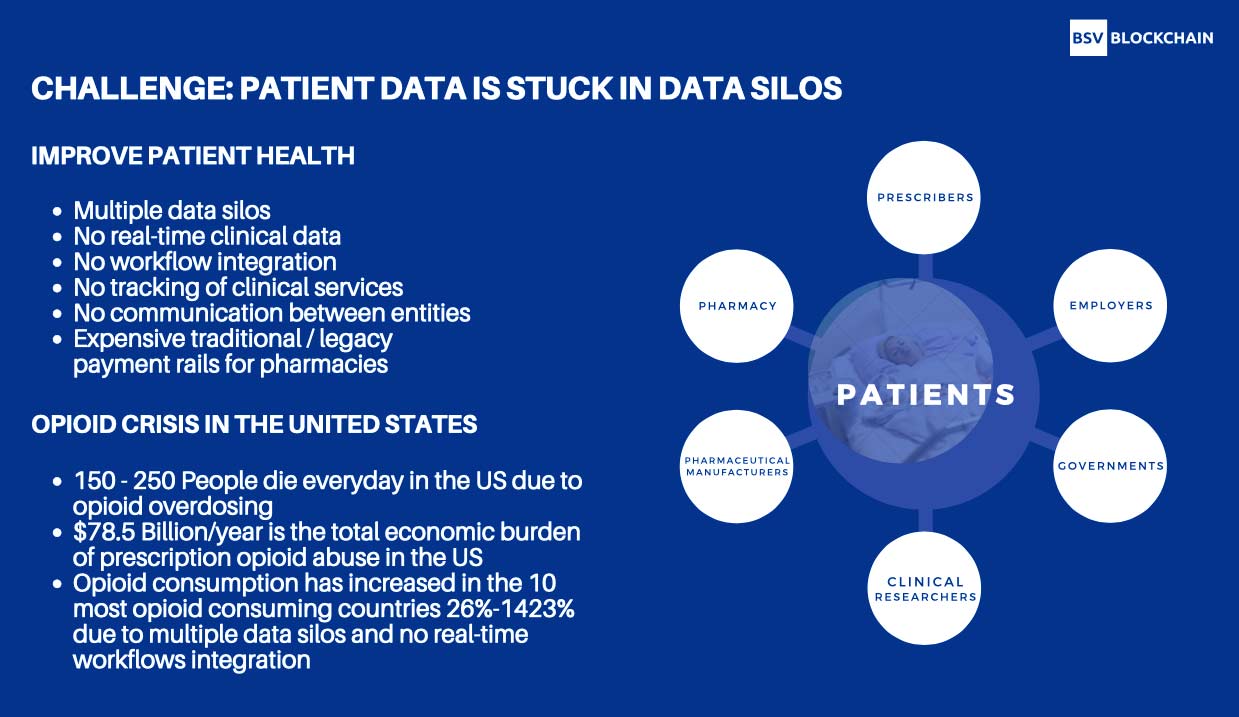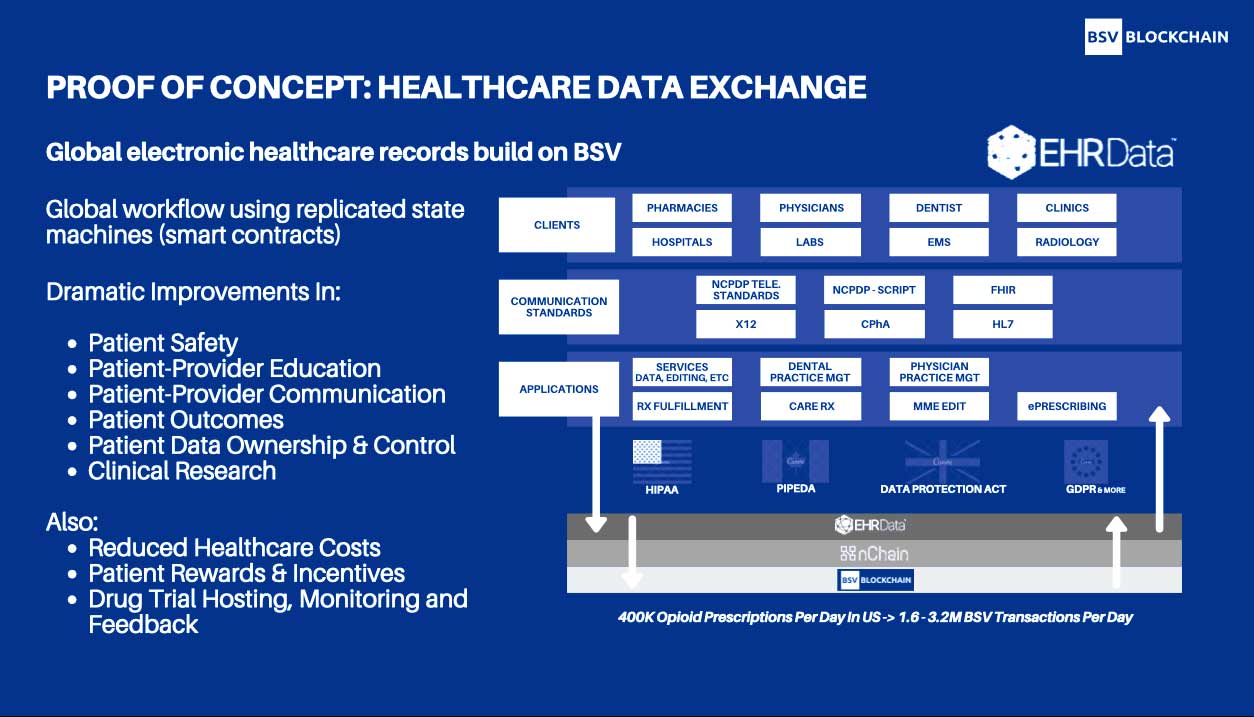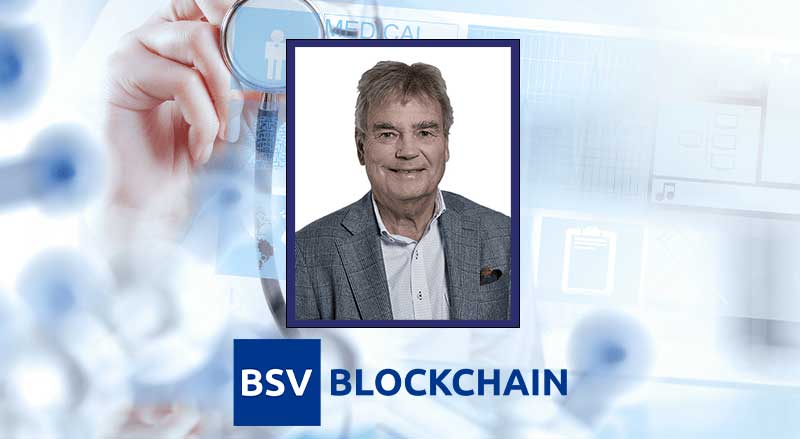Ron Austring, chief scientist of Synerio (previously EHR data), is working towards providing a single source of truth for healthcare data on a public blockchain. The company has two APIs; a data exchange that takes data in and allows it to go out (data providing and data consuming), and a workflow engine that integrates with healthcare providers to provide workflow services to them.
The opioid addiction crisis afflicting the United States and many other countries
Synerio is addressing the opioid addiction crisis using blockchain technology. The company believes patients own their own healthcare data. They’re also working towards taking all the healthcare data silos that exist in the United States and combining them into a single silo. Doing this with the BSV blockchain will allow the system to track all medical services across all the industries involved, while ensuring the privacy and ownership of individuals’ data.

Ron describes the process: ‘When a patient goes to a pharmacy and fills a prescription for an opioid drug, Synerio captures the event under a GPR – their global patient record – that gets stored in a secure, encrypted format.’. The system also writes that data – the hash of that data – to the public blockchain and to an archival node so that data can never be destroyed or tampered with.

He warns that patients taking opioid drugs often ‘prescription shop’, or get the same prescription filled at multiple pharmacies. Once all pharmacies are plugged into Synerio’s system, they’ll be able to detect these occurrences through an MME edit. ‘An MME edit is a morphine milligram equivalent edit that calculates the equivalency of morphine in their bloodstream to compare it against thresholds,’ he clarifies. If it’s the first time someone takes an opioid, they’re referred to patient education via a mobile app in the form of an insight. ‘They can watch a video introduction on opioids to learn how dangerous the drug can be. As they take more opioids and pass a dangerous threshold, they’ll be referred to appropriate insights.’
How a global electronic health record system will lead to better healthcare decisions by patients, providers and public health authorities
Offering a single source of truth on healthcare data means that providers, whether they are a pharmacy, a doctor, prescriber, a lab or a radiologist, have access to a patient’s complete health records. It also allows them to authenticate the providers themselves, similar to a KYC process and attribute them with a provider ID.
Ron demonstrates the value of such a central database: ‘With all these records in one place, it can be accessed from anywhere around the world. As a person moves throughout the world and requires access to their healthcare data or they need a healthcare service performed somewhere else in the world, they’ll have access to their original data. If it’s a prescription, it can be filled at a pharmacy in the United States, Canada or Great Britain while being checked against your drug profile to prevent drug interactions, etc.’
‘The beauty of this system is that the global workflow platform will allow pharmacies to contribute field research data,’ Ron elaborates. Synerio recently funded a university in Texas to do some work on genomic research in collaboration with them. ‘The research will let them determine if the patient can actually metabolise the drug that they’re about to take. Some patients are either slow or fast to metabolise certain drugs. Having this information will allow service providers to monitor the patient, or change the dosage of the drug to lead to better outcomes on the service.’
What’s next for Synerio Data
Synerio’s primary focus is the opioid crisis, where most of the responsibility tends to come down to the drug wholesalers. Drug wholesalers have been given huge fines in the United States, so they have to come up with a solution to track the supply chain right from the manufacturer, through them, all the way to the patient.
Once that is done, Synerio will take on all the prescriptions in the United States – currently around 4.2 billion transactions of prescriptions filled in the United States. ‘Our system will be able to handle each of those transactions uniquely through smart contracts and MME edits, genome metabolisation edits,’ he expounds. A single prescription could generate at least 10 to 15 more transactions, to tailor it to the needs of the individual. ‘This huge transaction volume is why we’re using the BSV blockchain – the only blockchain that can scale to meet our demand,’ Ron declares.
Synerio is also working on solutions for the COVID-19 crisis. In collaboration with vaccination vendors in the United States, they’re compiling the largest database for vaccinations – not only the COVID-19 vaccine. Their partner vendor is integrated with all the pharmacies and labs that already do those testing so that the moment a vaccine is ready, it will go onto their database and be available through Synerio’s service.
